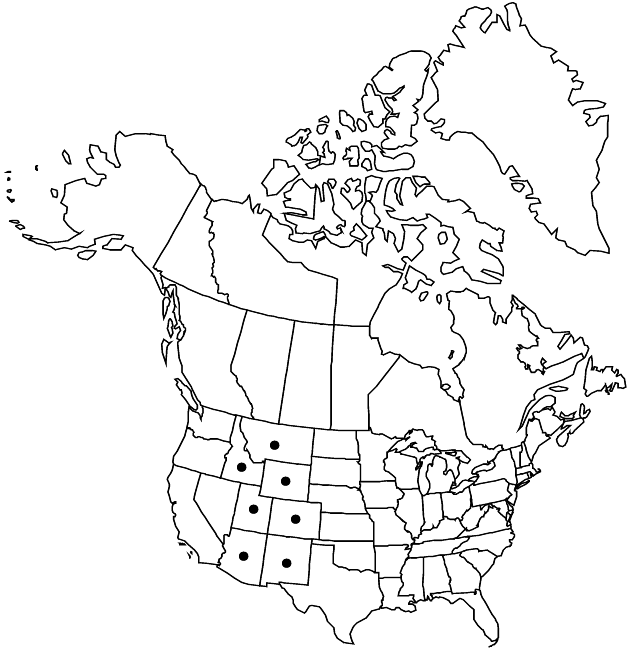Difference between revisions of "Herrickia glauca"
Sida 21: 897. 2004.
FNA>Volume Importer |
RevisionBot (talk | contribs) m (Bot: Adding category Revised Since Print) |
||
| (3 intermediate revisions by 2 users not shown) | |||
| Line 8: | Line 8: | ||
}} | }} | ||
|common_names=Gray’s aster | |common_names=Gray’s aster | ||
| + | |special_status={{Treatment/ID/Special_status | ||
| + | |code=E | ||
| + | |label=Endemic | ||
| + | }} | ||
|basionyms={{Treatment/ID/Basionym | |basionyms={{Treatment/ID/Basionym | ||
|name=Eucephalus glaucus | |name=Eucephalus glaucus | ||
| Line 38: | Line 42: | ||
-->{{Treatment/Body | -->{{Treatment/Body | ||
| − | |distribution= | + | |distribution=Ariz.;Colo.;Idaho;Mont.;N.Mex.;Utah;Wyo. |
|discussion=<p>Varieties 2 (2 in the flora).</p> | |discussion=<p>Varieties 2 (2 in the flora).</p> | ||
|tables= | |tables= | ||
| Line 68: | Line 72: | ||
|basionyms=Eucephalus glaucus | |basionyms=Eucephalus glaucus | ||
|family=Asteraceae | |family=Asteraceae | ||
| − | |distribution= | + | |distribution=Ariz.;Colo.;Idaho;Mont.;N.Mex.;Utah;Wyo. |
|reference=None | |reference=None | ||
|publication title=Sida | |publication title=Sida | ||
|publication year=2004 | |publication year=2004 | ||
| − | |special status= | + | |special status=Endemic |
| − | |source xml=https:// | + | |source xml=https://bitbucket.org/aafc-mbb/fna-data-curation/src/2e0870ddd59836b60bcf96646a41e87ea5a5943a/coarse_grained_fna_xml/V19-20-21/V20_842.xml |
|tribe=Asteraceae tribe Astereae | |tribe=Asteraceae tribe Astereae | ||
|genus=Herrickia | |genus=Herrickia | ||
| Line 79: | Line 83: | ||
}}<!-- | }}<!-- | ||
| − | -->[[Category:Treatment]][[Category:Herrickia]] | + | --> |
| + | |||
| + | [[Category:Treatment]] | ||
| + | [[Category:Herrickia]] | ||
| + | [[Category:Revised Since Print]] | ||
Latest revision as of 18:32, 6 November 2020
Perennials, 20–70 cm, colonial and cespitose, ± glaucous, sometimes stipitate-glandular distally; rhizomes woody, elongate and creeping, or short, erect, branched. Stems 1–7+, erect, sometimes branched proximally, straight, glabrous proximally, sometimes thinly scabridulous distally. Leaves cauline; proximal reduced, withering by flowering, firm; sessile; blades oblong or elliptic-oblong to lanceolate (sometimes narrowly), 40–120 × 5–25 mm, bases ± clasping, sometimes cuneate, main veins ± marked, margins entire, indurate, sparsely to densely scabridulous, apices acute to obtuse, mucronate (margins recurved at apex), faces glabrous. Heads 2–116+ usually in corymbiform, sometimes in open, paniculiform arrays. Peduncles glabrous to sometimes thinly scabridulous or villosulous; bracts 0–2, foliaceous, margins villose-ciliate or glabrous. Involucres campanulate, 6–9 mm. Phyllaries (15–35) in 4–5 series, keeled or rounded, ovate or oblong (outer) to lanceolate (inner), unequal, membranous, bases indurate, green zones in distal 1/5–1/3 or less (outer), reduced to midnerve or none (inner), margins erose, narrowly scarious, hyaline, sometimes purplish distally (inner), entire to villoso-ciliolate, apices ± appressed, obtuse or acute (outer), often purple and acute or acuminate (inner), sometimes apiculate, faces glabrous. Ray florets (8–)10–15(–19); corollas pale lavender, 8–18 × 0.7–1.3 mm. Disc florets 12–32; corollas yellow turning reddish purple, barely or not ampliate, 6.8–7.5 mm, tubes narrowly cylindric, shorter than funnelform throats, lobes spreading, lanceolate, 0.7–1.3 mm. Cypselae tan to stramineous, fusiform, ± compressed, 3.8–4.8 mm, ribs 7–10 (stramineous), faces glabrous or sparsely strigillose; pappi of (ca. 37) yellowish to cinnamonish bristles 6.4–7.2 mm.
Distribution

Ariz., Colo., Idaho, Mont., N.Mex., Utah, Wyo.
Discussion
Varieties 2 (2 in the flora).
Selected References
None.
Key
| 1 | Distal stems, peduncles, and phyllaries eglandular | Herrickia glauca var. glauca |
| 1 | Distal stems, peduncles, and phyllaries stipitate-glandular | Herrickia glauca var. pulchra |